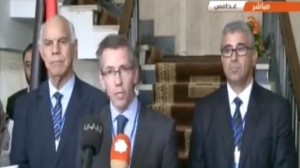By Hadi Fornaji.

Tripoli, 7 December 2014:
The chances for UNSMIL-brokered dialogue in just two days time seem thinner as both sides harden . . .[restrict]the conditions that will bring them to the negotiating table.
Libya Dawn has today demanded an end to international recognition of the House of Representatives and the Thinni government as one of the four conditions for it to enter into “unconditional dialogue”.
Saying that it had been the first to call for dialogue which it continued to support, the Libya Dawn press office demanded on the organisation’s Facebook page that it would not negotiate unless the Supreme Court ruling on the illegality of the electoral law passed by the GNC was recognised as valid.
It went on to insist that the GNC and the administration it had appointed led by Omar Al-Hassi was the only legitimate authority in Libya. It also demanded that the Political Isolation Law stay in place and be implemented and went on to insist that the militias making up the Libya Dawn forces were the real national army.
Given that yesterday the House of Representatives set out its own four conditions, hardy less unbending that those of Libya Dawn, it is hard to see where UNSMIL chief Bernardino Leon is going to find much common ground, save that both sides accept the principle of dialogue.
He is hoping restart talks in just two days time, at a location still to be announced. The first talks, at the end of September, were held in Ghadames.
The HoR has again insisted that it is the only legitimate authority. It also wants to know in advance, who else will be party to the negotiations, the talks’ framework and a timetable. It has said that it will not sit down with anyone that has been responsible for “the crisis” and obstructed democratic politics.
The HoR has further reiterated that the Libyan National Army is the sole legitimate military formation and that militias should disband while their leaders can play no part in any talks.
Though UNSMIL has condemned government airstrikes, along with other violence on both sides, the UN body continues to insist that it recognises only the government of Abdullah Al-Thinni and the HoR which appointed it. It has also said that there can be no conditions for talks and that those who refuse to take part are likely to face sanctions. [/restrict]






